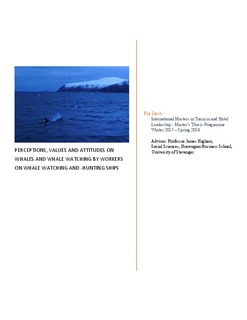Perceptions, values and attitudes on whales and whale watching by workers on whale watching and hunting ships
Master thesis
Permanent lenke
http://hdl.handle.net/11250/2426496Utgivelsesdato
2016-07-13Metadata
Vis full innførselSamlinger
- Studentoppgaver (SV-NHS) [561]
Sammendrag
Abstract The aim of this study was to gain a better understanding of the views and attitudes of the stakeholder groups whale hunters and whale watching tourism workers, as little research has previously been done in this area. As watching whales in captivity has gained much negative attention worldwide many aquariums have recently been forced to close down, and this is expected to lead to a rapid growth in the area of whale watching tourism.
The research questions were divided into the following main themes: 1) Attitudes towards whales, 2) Is whaling and whale watching mutually exclusive, 3) Information about the whaling industry, and 4) Attitudes towards environmental values. Research was conducted in Northern Norway and Iceland, leading to 19 personal, semi-structured interviews. Data was analyzed using NVivo 11 PRO software, confirming previous research results, but also proving new information: in Norway the whale hunters and whale watching tourism workers had mostly opposing views and feelings about whales and their utilization, but agreed on the importance of nature preservation. The whale hunters further expressed annoyance towards the demands of the tourism industry, but felt the two industries can exist side by side. Tourism workers generally wanted to see whaling stopped. In Norway demands for more control and education were heard within the whale watching industry, and the entire tourism infrastructure was seen as being in need of improvement. In Iceland Finn whaling has come to an end, but Minkie whaling is still done, and people working with whale watching tourism hold strong anti-whaling opinions. Hence, the mutual existence of the two industries is not seen as an option. This is also communicated to tourists in a more direct way than in Norway, e.g. by asking tourists to boycott restaurants that serve whale meat. Future research could be conducted with younger or female whalers / workers in the whale watching tourism industry. KEYWORDS: whaling, whale watching tourism, whale meat, sustainability, profitability, green values.
Beskrivelse
Master's thesis in International Hospitality Management
Utgiver
University of Stavanger, NorwayOpphavsrett
Pia Järvi / Universitetet i StavangerBeslektede innførsler
Viser innførsler beslektet ved tittel, forfatter og emneord.
-
Whales and whale meat dining opportunities in destination image perception.
Fironova, Alla (Masteroppgave/UIS-SV-NHS/2019;, Master thesis, 2019-06-11)The current study aimed to have an overlook of people’s online expressions of their attitudes and perceptions towards whaling in Norway and of their views on whale meat as a traditional culinary experience, and whether ... -
Anticipated regret and moral norm in consumers’ intention to select whale friendly restaurants: Augmenting the theory of planned behaviour
Asbjarnarson, Hjörtur (Masteroppgave/UIS-SV-NHS/2017;, Master thesis, 2017-06-15)This study uses the theory of planned behaviour (TPB) to examine the impact of anticipated regret and moral norm on intention to select whale friendly restaurants. The predictive power of the original theory and the ... -
Advanced Deep Learning for Whale detection in VHR Satellite Images
Rabbani, Rabbir Bin (Masteroppgave/UIS-TN-IDE/2020;, Master thesis, 2020)With the use of very high resolution (VHR) satellite images we can locate whales. In this thesis, I have experimented with different advanced architectures in Deep Learning to detect whales in satellite images. I have also ...

